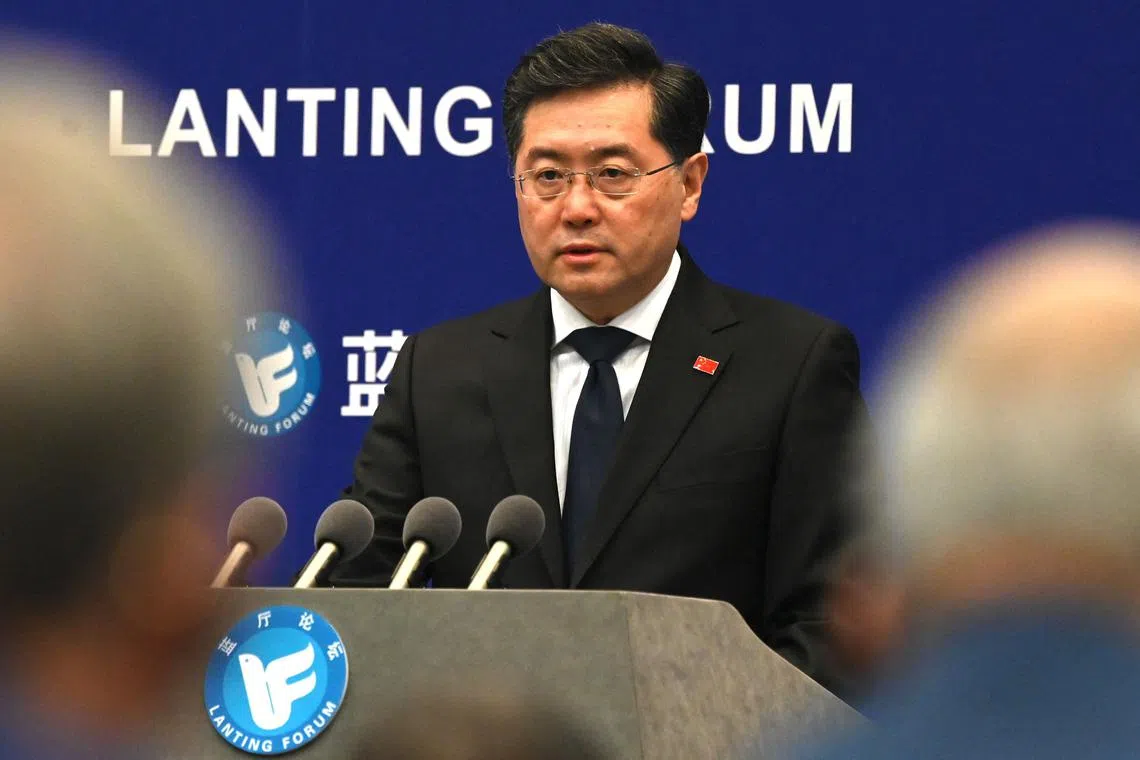China says certain countries must stop ‘fuelling the fire’ in Ukraine conflict
Sign up now: Get insights on Asia's fast-moving developments

Chinese Foreign Minister Qin Gang said China urges certain countries to stop fuelling the fire in the Russia-Ukraine conflict.
PHOTO: AFP
Follow topic:
BEIJING – China is “deeply worried” that the Ukraine conflict could spiral out of control, China’s Foreign Minister Qin Gang said on Tuesday, and called on certain countries to stop “fuelling the fire”.
Beijing, which in 2022 struck up a “no limits” partnership with Moscow,
The United States has warned of consequences if China provides military support to Russia, which Beijing says it is not doing.
“China is deeply worried that the Ukraine conflict will continue to escalate or even spiral out of control,” Mr Qin said in a speech at a forum held at the Foreign Ministry.
“We urge certain countries to immediately stop fuelling the fire,” he said in comments that appeared to be directed at the US, adding that they must “stop hyping up ‘today Ukraine, tomorrow Taiwan’”.
“We stand firmly against any form of hegemony, against any foreign interference in China’s affairs,” he said.
Mr Qin’s comments came as Russian news agency Tass said China’s top diplomat Wang Yi was due to arrive in Moscow on Tuesday and ahead of a “peace speech” President Xi Jinping is expected to deliver on Friday, the anniversary of the Ukraine invasion.
A Chinese Foreign Ministry spokesman said Mr Wang Yi’s visit to Russia would be an opportunity to further promote ties between the two countries.
“China is willing to take the opportunity to work with Russia to promote bilateral relations along the direction set by the two heads of state,” Mr Wang Wenbin said at a regular news briefing.
Also on Tuesday, China released a paper on the Global Security Initiative, President Xi Jinping’s flagship security proposal which aims to uphold “indivisible security”, a concept also endorsed by Russia.
Russia has insisted that Western governments respect a 1999 agreement based on the principle of “indivisible security” that no country can strengthen its own security at the expense of others.
On Monday, Mr Wang Yi called for a negotiated settlement to the Ukraine war during a stopover in Hungary.
The same day, US President Joe Biden made a surprise visit to Kyiv in a show of solidarity with Ukraine, promising US$500 million (S$669 million) worth of military aid to the country and additional sanctions against Russian elites to be unveiled in full this week.
Beijing has refrained from condemning Moscow’s operation against Ukraine or calling it an invasion. This is in line with the Kremlin’s description of the war as a “special military operation” to protect Russia’s own security.
Russia’s Feb 24, 2022, invasion of Ukraine has triggered one of the deadliest European conflicts since World War II and the biggest confrontation between Moscow and the West since the 1962 Cuban Missile Crisis.
The US casts China and Russia as the two biggest nation-state threats to its security. Mr Xi has stood by Russian President Vladimir Putin, resisting Western pressure to isolate Moscow.
US Secretary of State Antony Blinken warned on Saturday that the US was very concerned that China is considering providing “lethal assistance” to Russia, which he told Mr Wang Yi “would have serious consequences in our relationship”.
“There are various kinds of lethal assistance that they are at least contemplating providing, to include weapons,” Mr Blinken said in an interview with NBC News, adding that Washington would soon release more details.
The European Union’s top foreign affairs official Josep Borrell on Monday warned against China sending arms to Russia, saying it would be a “red line”, echoing statements from other European foreign ministers attending a meeting in Brussels.
Any Chinese weapons supplied to Russia would risk a potential escalation of the Ukraine war into a confrontation between Russia and China on the one side and Ukraine and the US-led Nato military alliance on the other.
Beijing has repeatedly accused Washington of escalating the conflict by supplying weapons to Ukraine. On Sunday, during a meeting with Mr Blinken on the sidelines of the Munich Security Conference, Mr Wang said the US “should promote a political solution to the crisis, instead of adding fuel to the fire”. REUTERS

